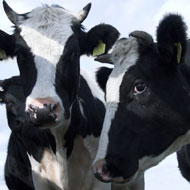Outbreaks of lumpy skin disease in Greece

It is thought the outbreaks may have have been vector spread from recent outbreaks in Turkey.
Outbreaks of lumpy skin disease have been confirmed in the EU for the first time.
The first outbreaks in Greece were reported to the World Organisation for Animal Health on 21 August. Since then, more than 40 cases have been confirmed in the Evros region of the country, which is on the European border with Turkey. Nearly 600 cows have now been culled.
Lumpy skin disease is a potentially fatal pox disease of cattle. It has economic implications as it can cause a temporary drop in milk production, temporary or permanent sterility in bulls and hide damage.
The source of the outbreaks in Greece has not yet been confirmed, but Defra's International Disease Monitoring team says it is likely to be vector spread from recent outbreaks in Turkey.
Cases of the disease have been reported regularly in Turkey since 2013, but it was confirmed in June this year that it had spread to the European side of the country.
As well as culling of infected animals, other disease control measures include movement restrictions and a 20km surveillance zone in Greece. There is currently no approved vaccine for the disease in the EU.
The risk of lumpy skin disease, goat pox or sheep pox entering the UK through imported skins or hides is thought to be low, according to a risk assessment commissioned by Defra last year.
Nonetheless, the outbreaks raise concerns about transboundary diseases and the effectiveness of current controls.



 The latest
The latest